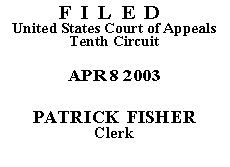

| ZAHI AWAD, also known as Tony
Awad,
Petitioner, v. JOHN ASHCROFT, Attorney General of the United States, Respondent. |
|
Petitioner Zahi Awad, a native and citizen of Lebanon, petitions for review of a decision of the Bureau of Immigration Appeals (BIA) denying his application for asylum and withholding of deportation, and granting voluntary departure. We deny the petition for review.
The pertinent facts are discussed at length in the decisions of the Immigration Judge (IJ) and the BIA, and we will not repeat them in detail here. Mr. Awad first entered the United States in 1984 on a student visa. On May 12, 1988, the Immigration and Naturalization Service (INS) entered a show cause order against him, alleging that he had been employed without permission. Mr. Awad conceded deportability, but applied for asylum and withholding of deportation.
The IJ found Mr. Awad deportable, denied asylum and withholding of deportation, and granted voluntary departure. Mr. Awad appealed to the BIA. While his appeal was pending, he filed a motion to reopen and for reconsideration. The BIA dismissed Mr. Awad's appeals from the IJ's decision denying asylum and withholding of deportation and from his decision denying suspension of deportation.(1) It further denied his motion to reopen and for reconsideration.
Mr. Awad begins by attacking the BIA's consideration of the evidence in his case. He attached four exhibits to his motion to reopen. "A motion to reopen proceedings shall not be granted unless it appears to the Board that evidence sought to be offered is material and was not available and could not have been discovered or presented at the former hearing[.]" 8 C.F.R. § 3.2(c)(1). The BIA concluded that all of the materials could have been submitted at the former hearing, except a letter from Hadi Awad, Mr. Awad's brother.
We review the BIA's determination that a motion to reopen does not satisfy the requirements of § 3.2(c)(1) for an abuse of discretion. Osei v. INS, 305 F.3d 1205, 1208 (10th Cir. 2002). "[M]otions to reopen are disfavored in deportation proceedings." INS v. Abudu, 485 U.S. 94, 107 (1988). Mr. Awad presents no argument in opposition to the BIA's conclusion that three of the exhibits, the Zakehm letter, the Karaki affidavit, and the New York Times article, could have been presented at the time of the hearing. We discern no abuse of discretion in the BIA's refusal to reopen based on this evidence.
The letter from Hadi Awad is unsworn. The BIA expressed a concern that the letter lacked appropriate indicia of reliability, and therefore did not provide a sufficient basis for reopening. We cannot say that this finding constituted an abuse of discretion.
Mr. Awad next contends that the BIA gave insufficient consideration to affidavits from Walid Dagher and Michael Matar. The BIA's decision mentions each of these affidavits, discussing their content in detail. Admin. R. at 3. "[T]he BIA is not required to discuss every piece of evidence when it renders a decision. . . . [A]ll that is necessary is a decision that sets out terms sufficient to enable us as a reviewing court to see that the Board has heard, considered, and decided." Hadjimehdigholi v. INS, 49 F.3d 642, 648 n.2 (10th Cir. 1995) (quotation omitted). The BIA fulfilled its duty in this case.
Mr. Awad takes issue with the BIA's discussion of the State Department's 2001 Country Report for Lebanon. The BIA is required to give careful, individualized review of the evidence it considers in support of an asylum claim, including Country Reports. See Krastev v. INS, 292 F.3d 1268, 1277 (10th Cir. 2002). The BIA acknowledged in its decision that the 2001 Country Report indicates "that the government's overall human rights record was poor and that serious problems remain." Admin. R. at 5. It concluded, however, that Mr. Awad was unlikely to be harmed by members of the now-disbanded Lebanese Forces. Id. This determination is supported by substantial evidence.
We turn to the merits of the BIA's decision. "A request for asylum involves two steps. First, the asylum applicant has the burden of proving [his] statutory eligibility by establishing refugee status." Woldemeskel v. INS, 257 F.3d 1185, 1188 (10th Cir. 2001). "If the applicant proves [his] eligibility for refugee status, the Attorney General then exercises discretionary judgment in either granting or denying asylum." Id. at 1189. Upon this record, we conclude that the BIA's decision that Mr. Awad failed to establish refugee status is supported by substantial evidence. Since he cannot show his entitlement to asylum, he also fails to establish eligibility for withholding of deportation. See id. at 1193.
Mr. Awad's request for a stay of mandate to apply for reinstatement of voluntary departure is DENIED, without prejudice to his ability to re-apply for such a stay in the event that he cannot obtain prompt consideration by the BIA of his motion. We DENY the petition for review and AFFIRM the BIA's decision denying asylum and withholding of deportation and denying Mr. Awad's request for reopening.
Entered for the Court
Circuit Judge
*. This order and judgment is not binding precedent, except under the doctrines of law of the case, res judicata, and collateral estoppel. The court generally disfavors the citation of orders and judgments; nevertheless, an order and judgment may be cited under the terms and conditions of 10th Cir. R. 36.3.
1. The BIA's decision upholding the IJ's decision to deny suspension of deportation is not at issue in this appeal.